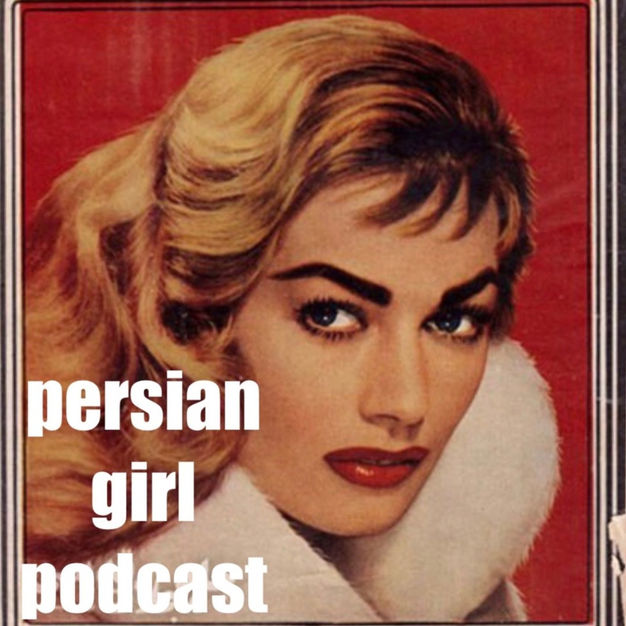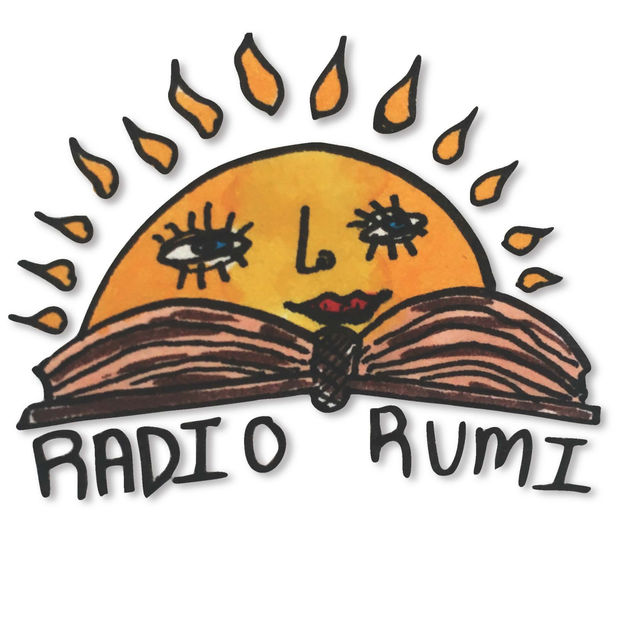
Persian Girl Podcast's Podcast
Persian Girl Podcast
Two Persian girls discuss topics deemed unorthodox or taboo in the Persian community and interview Persian women who offer an interesting perspective. Persian Girl Podcast is a new platform for modern Middle Easterners, Persian or not, who want to speak openly and candidly about their experiences in communities that are not up to date with their standards of living.
- 37 minutes 53 secondsNature, resilience, and the sukkah as a medium: Interview with Jonathan York
In this episode, I speak with Jonathan York, attorney and artist, at the Skirball center (apologies for any real life sound) to discuss The Sukkah Project, his exhibition at the Skirball Center in LA, opening October 8-November 3. The exhibition is the latest in a 6 year exploration, The Sukkah Project, where he has explored the Sukkah as an artistic medium. We also discuss his first film, Al Tira, which documents life in Israel post October 7th and the current climate for Jewish filmmakers and artists.
This episode features sounds that Jonathan recorded on his visit to Kibbutz Be'eri.
Details for the exhibit can be found at:
https://www.skirball.org/museum/sukkah-project-force-majeure
https://www.instagram.com/jonathanyork13/
More on Sukkot:
Sukkot "the feast of tabernacles" is a Jewish week long holiday beginning on the 15th day of the month of Tishrei. It is an agricultural holiday and one of the three pilgrimage festivals in which Jews are instructed to the temple in Jerusalem. Jews celebrate by building a sukkah (hut or booth) and making a blessing of the four species as described in the Torah: etrog (citron), lulav (palm branch), hadas (myrtle), and arava (willow). The sukkah is intended for festive dining and gathering. Although the structure represents the huts the Israelites lived in during the years of wandering after escaping slavery in Egypt, it also represents unity and hospitality as the structure is a place to invite those in need.15 October 2024, 7:00 pm - 46 minutes 1 secondExploring the world of Jewish food in Iran with Tannaz Sassooni
In this episode, I speak with food writer Tannaz Sassooni who is compiling recipes (one grandmother at a time) to create a cookbook of Jewish food from different cities in Iran. Tannaz sheds light on the history of Jewish-Iranian recipes, unique background behind Kashi dishes from her family's origins, and her family's migration story from Iran to America.
Keep up with Tannaz's food journey on instagram:
https://www.instagram.com/tannazsassooni/
Intro music:
Ghormeh Sabzi by Velshodegan17 September 2024, 7:00 pm - 49 minutesInterview with Danielle and Galeet Dardashti on the Nightingale of Iran
In this episode, Danielle and Galeet Dardashti return to discuss the ending of their documentary podcast series the Nightingale of Iran, which explores and uncovers the life of their grandfather, Younes Dardashti, a famous Jewish singer in Iran. We discuss the tapes their family recorded starting from the 1950s that were used throughout the series, the reception of their podcast, their theory on the lasting effects of the "Motreb"/artist stigma in Jewish Persian communities, and why there are so few Jewish Persians in art and culture philanthropy and academia.
Song details: "Jadeha," composed by Farid Dardashti with lyrics by Bijan Samandar.
To find out about future events with Danielle and Galeet on The Nightingale of Iran, check out their website:
https://www.nightingaleofiran.com/27 August 2024, 12:00 am - 58 minutes 31 secondsJudeo Persian Literature with Alan Niku Pt. 2
Alan Niku returns to the podcast to discuss another selection of Judeo-Persian writers, including poets, philosophers, and biblical commentators such as Emrānī, Baba'i ben Lotf, and Simantov Melamed. Their exploration of these writers raises questions about how Jews engaged with Sufism as Islamic rulership in Persia intensified, leading to forced conversions and massacres of minorities. They also delve into why poetic writings, such as these, remain undervalued and obscure within Western society, especially amongst the Persian Jewish diaspora.
21 June 2024, 3:00 pm - 1 hour 11 minutesJudeo Persian Literature with Alan Niku
Judeo-Persian literature (Modern Persian written in Hebrew characters) is likely the largest untapped group within Jewish and Persian vernacular texts. Manuscripts are scattered worldwide, found in the bottoms of drawers in people's homes and some in libraries, yet they remain untranslated and largely inaccessible.
Alan Niku, a filmmaker and writer who began researching Persian Jewish history around ten years ago in hopes of preserving it, joins Millie in discussing his findings on translating Judeo Persian manuscripts which includes poetry and philosophical teachings from writers such as Shahin Shirazi, Yehuda Ben Elazar, Amina and others. Aside from his independent work researching Persian Jewish history, Alan shares his work as a linguist, documenting various Judeo Persian languages and teaching Neo-Aramaic, which he decided to learn after discovering the language in his paternal grandfather's family line.
You can find Alan's lectures on related topics here:
https://www.youtube.com/watch?v=UYsvRszbe9w
https://www.youtube.com/watch?v=BXh1D1ojves
https://www.youtube.com/watch?v=9Yxmn-dLmeQ
https://www.youtube.com/watch?v=PkCiEtk-4Gs
Instagram:
https://www.instagram.com/the_dreamy_kalimi/The Jewish Language Project:
https://www.jewishlanguages.org/jewish-language-project
Intro music: Emrani's Selichot sang by Nasser Zar
https://www.youtube.com/watch?v=H9kwUSNG9Fg&ab_channel=ShlomoShawnAziz13 May 2024, 6:00 pm - 47 minutes 2 secondsInterview with Matthew Nouriel: connecting Iran and Israel
In this episode, I speak with Matthew Nouriel (sometimes known as The Empress Mizrahi) an activist, content creator, and drag queen from the Persian Jewish diaspora. Matthew is an advocate for LGBTQ+ rights, Iranians, Jews and the state of Israel. Together we discuss the connections between a free Iran and the fight against Hamas/the Islamic Republic's terrorist proxies, authentic vs. inauthentic activism, what's next for Persian Jews, and Matthew's families unique migration story.
Follow Matthew on instagram: https://www.instagram.com/matthewnouriel/?hl=en
Learn more about JIMENA: https://jimena.org/21 April 2024, 11:00 pm - 40 minutes 9 secondsReflections on Queen Esther with Maxine Divon
In this episode, Maxine (from episode 3 Ancestral Healing) returns to reflect on the lessons from the Book of Esther/Purim from the Torah, which revolves around a Jewish woman in Persia named Esther who becomes Queen in the Persian Empire (5th BCE) and hides her Jewishness in order to survive. When Esther's uncle Mordecai, discovers that an official in court, Haman, has a plan to establish a decree to slay all the Jews in the empire, Esther throws a series of feasts for the King and eventually wins him over and not only embraces her Jewishness but saves the entire population of Jews from persecution in the Persian empire (this is a very brief summary you can find the full text linked below).
We explore how Queen Esther embodies what it means to integrate our Jewish and Persian backgrounds, mind-body connection practices, and divinity: the feminine divine and divine timing.
Full text of Esther:
https://www.sefaria.org/sheets/85468
Music:
https://www.youtube.com/watch?v=hTnvCgvuLl0&ab_channel=KamranNeydavoud19 March 2024, 10:00 pm - 54 minutes 51 secondsReclaiming Motreb: The Dardashti Family Legacy
In this episode, Millie delves into the history of the Dardashti family with sisters Danielle and Galeet, the creators of the podcast documentary series, "The Nightingale of Iran." Unveiling the captivating saga of their grandfather, Younes Dardashti, a revered religious Jewish singer in 1950s Iran, who graced the Shah's Palace and radio with his melodious voice, alongside their father, Farid Dardashti, a teen idol on Persian television.
Together, they unravel the complexities surrounding the stigma attached to "motreb" (musician/entertainer) in Persian Jewish culture, shedding light on the cultural dynamics that led their family to depart Iran at the pinnacle of their fame. Reflecting on their upbringing and the disconnect from their Persian heritage despite a lineage steeped in rich history, they explore the notion of selective memory and the profound significance of asking the right questions, culminating in a poignant journey of self-discovery and understanding.
You can find "The Nightingale of Iran" on all streaming platforms:
https://www.nightingaleofiran.com/
Music featured on this episode is from Galeet's album Monajat.
Song details:
Monajat (feat. Younes Dardashti) · Galeet Dardashti29 February 2024, 1:00 pm - 37 minutes 31 secondsZar Amir Ebrahimi: Holy Spider, Life in Exile, and Iran
Archival episode from November 25, 2022
In an independent interview, Millie Efraim speaks with Zar Amir Ebrahimi, lead actress of Holy Spider (winner, Best Actress, Cannes)— the uncompromising film noir (dir. Ali Abbasi) painting the life of a serial killer targeting prostitutes in Mashhad, about how she built her character, Islamic fanaticism vis-à-vis sexual perversion, life in exile outside of Iran, the current revolution, and the real Spider Killer's family's response to the controversial film. Zar also shares fascinating anecdotes from behind the scenes of filming.Watch the full interview on Youtube: https://www.youtube.com/watch?v=c0ciUmyDYyk
12 February 2024, 7:00 pm - 1 hour 27 minutesAncestral Healing
In this episode, Maxine Divon shares her personal journey into the self and spirituality for a discussion about the way our ancestral history impacts us. Maxine shares from her personal experience - as a woman in the Persian Jewish community and in the business world - and from the fields she’s studied including Jungian Psychology, Ancestral Healing, Archetypal Astrology and more recently Kabbalah. Her and Millie unpack various traumas and gifts passed through generations of Persian Jewry, and explore tools for doing this kind of inner work in a self-regulated way, so that everyone is able to receive the gifts and growth that come from self-inquiry, without reactivating past cycles of wounds.
Mentions:- www.MaxineDivon.com or [email protected]
- Rabbi Tirza Firestone - Wounds into Wisdom book
- Caroline Myss - Sacred Contracts book on archetypes
- Terry Real (family pathology quote)
Outline:
- Introducing Maxine - How we Met, Her Story
- ~7 mins - Persian Jewish story and reclaiming our heritage (Maxine’s 23&Me)
- ~14 mins - What is Ancestral Healing? Rupture & Repair; Ancestral Gifts; Kabbalistic Wisdom; Surviving vs. Thriving
- ~30 mins - Collective healing: introducing Archetypes and the “sister wound”; understanding the trauma vortex; Persian ideas of “ghar” and “aberoo”
- ~50 mins - Carl Jung’s concept of individuation; the ultimate Persian Jewish archetype, Queen Esther!
- ~58 mins - Celebrating the Matriarchs; more on Jungian Individuation vs. Separation; Reframing our Personal Narratives
- ~1:09 Maxine’s Spiritual Journey & Sacred Wound; finding our cosmic light
- ~1:16 Persian Wrap Up ;) & an Invitation to Persian women who want to participate in collective healing; Becoming Butterflies 🦋
1 February 2024, 12:00 pm - 1 hour 3 minutesInterview with Debbie Lechtman of Roots Metals
PGP hosts, Millie Efraim and Natalie Sanandaji, bring on historian Debbie Lechtman to discuss the history of Ancient Judea/the Kingdom of Israel, Jewish presence in the land for the last 3000+ years, the events leading up to 1948, and what is at the core of the Israel-Palestine conflict.
Debbie is a Jewish, Israeli, and Latina author, educator, content creator, and artist, specializing in Jewish history and antisemitism. She is well-known in Jewish spaces for condensing complex, multilayered, nuanced, and obscure Jewish history topics into more easily accessible education.
For context, this episode was recorded on November 22nd and the introduction was recorded on November 30th.
You can support Debbie's work and find all sources on her website: https://www.rootsmetals.com/pages/about
Instagram:
https://www.instagram.com/rootsmetals/
Patreon: https://www.patreon.com/rootsmetals
Her most recent blog post: https://www.rootsmetals.com/blogs/news/lies-about-1948
Listen to Natalie's story of surviving the October 7th Massacre:
https://www.foxnews.com/video/6339713888112
Abba Iban Documentary "Israel: A Nation is Born" which Millie refers to footage of Holocaust survivors being rejected at the border of Palestine can be watched here: https://www.youtube.com/watch?v=bdHQ6NTvq00&list=PLICqGk8IqdAKeCij_HmHPpkI28ckTlwSS30 November 2023, 7:00 pm - More Episodes? Get the App
Your feedback is valuable to us. Should you encounter any bugs, glitches, lack of functionality or other problems, please email us on [email protected] or join Moon.FM Telegram Group where you can talk directly to the dev team who are happy to answer any queries.
 Radio Rumi
Radio Rumi
 شهاب چراغی
شهاب چراغی
 Persian
Persian
 Top Tech News - Persian
Top Tech News - Persian